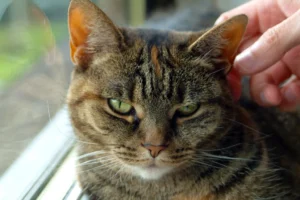Cats are fascinating creatures with unique behaviors, and one of these behaviors that can puzzle cat owners is spraying during heat. Understanding why cats do this can help owners better care for their feline friends. Let’s explore the reasons behind this behavior and how to manage it.
Cats spray during heat as a way to attract potential mates. This behavior is more common in unspayed females, but male cats can also spray to mark their territory. By understanding the reasons behind this behavior, cat owners can take steps to reduce or prevent it. Now, let’s delve deeper into why cats spray during heat.
What Causes Cats to Spray During Heat?
Did you know that the urge to spray is a natural behavior for cats in heat? Female cats in heat release pheromones that signal their availability to male cats. These pheromones are irresistible to male cats, triggering them to spray in response. Additionally, hormonal changes during heat can lead to increased marking behavior in both male and female cats.
Can Spaying or Neutering Help Prevent Spraying?
Spaying or neutering your cat can greatly reduce or even eliminate spraying behavior. Spaying a female cat will prevent her from going into heat, thus decreasing the production of those enticing pheromones. Neutering a male cat can also reduce his urge to spray, as it can lessen his territorial instincts. Additionally, spaying and neutering can have numerous health benefits for your furry friend, so it’s a win-win situation for both of you.
Extra Tip: If your cat has already started spraying, don’t worry – spaying or neutering can still help curb this behavior, especially when combined with positive reinforcement and environmental enrichment.
How to Manage Spraying Behavior in Cats
The key to managing spraying behavior in cats during heat is to provide a conducive environment that reduces stress and anxiety. Make sure your cat has access to a clean litter box at all times and consider using pheromone diffusers to create a calming atmosphere. Additionally, providing plenty of vertical spaces for your cat to climb and perch can help them feel more secure.
Regular play sessions can also help them relieve pent-up energy and reduce the likelihood of spraying. If the behavior persists, consult with your veterinarian to rule out any underlying medical issues and consider spaying or neutering your cat to reduce hormonal-driven behaviors.
Remember, patience and consistency are crucial when addressing spraying behavior in cats. With the right approach and a little understanding, you can help your feline friend feel more comfortable and eliminate unwanted spraying.
Are There Medical Reasons for Spraying?
While spraying behavior in cats is often associated with mating behaviors during heat, there can also be underlying medical reasons for this behavior. Urinary tract infections, bladder stones, and other urinary issues can lead to increased frequency of spraying in cats.
If your cat suddenly starts spraying or changes their spraying habits, it’s essential to consult with your veterinarian to rule out any potential medical issues. A thorough physical examination and possibly urine tests can help determine if there are any underlying health concerns contributing to the spraying behavior.
Addressing any medical issues promptly can not only help manage spraying behavior but also ensure your cat’s overall health and well-being. Remember, early detection and intervention are key when it comes to addressing medical reasons for spraying behavior in cats.
Environmental Factors that Influence Spraying
Cats are known for their territorial behavior, especially during heat cycles. When a cat is in heat, they may spray to mark their territory and attract potential mates. However, environmental factors can also play a significant role in influencing spraying behavior.
One key factor is stress. Cats may spray more when they are feeling anxious or stressed. This can be triggered by changes in their environment, such as moving to a new home, introducing a new pet, or changes in your routine. Providing a stable and comforting environment for your cat can help reduce spraying during heat cycles.
Another factor to consider is access to the outdoors. Cats who have outdoor access may be more likely to spray, as they encounter other felines in their territory. If possible, consider restricting outdoor access during your cat’s heat cycle to reduce spraying behavior.
Additionally, ensuring your cat has a clean litter box and a comfortable space to relax can also help reduce spraying. Cats may spray if they feel their litter box is dirty or inadequate, so maintaining a clean litter box is essential in preventing unwanted spraying behavior.
Remember, understanding your cat’s needs and providing a safe and stress-free environment can go a long way in reducing spraying during heat cycles.
Understanding the Difference Between Spraying and Urinating
It’s essential for cat owners to differentiate between spraying and urinating behaviors in cats to address each issue effectively. Spraying is when a cat backs up to a vertical surface, raises their tail, and releases a small amount of urine. This behavior is often associated with marking territory during heat cycles.
On the other hand, urinating involves a cat squatting to eliminate a larger amount of urine on a horizontal surface, like a litter box. Urination outside the litter box can be a sign of a medical issue or behavioral problem, such as a urinary tract infection or stress.
To address spraying, consider spaying or neutering your cat to reduce hormonal-driven behavior. Providing environmental enrichment, such as interactive toys and scratching posts, can also help redirect your cat’s spraying behavior.
For urination issues, consult with your veterinarian to rule out any medical causes. Ensure your cat has a clean litter box in a quiet and private location. Using pheromone diffusers or calming collars can also help reduce stress-related urination problems.
By understanding the difference between spraying and urinating behaviors, you can take the necessary steps to address each issue effectively and ensure your cat’s well-being.
Seeking Professional Help for Spraying Behavior
Dealing with a cat spraying during heat can be frustrating for pet owners. If you’ve tried various methods to manage this behavior without success, it may be time to seek professional help. Pet behaviorists or veterinarians can offer valuable insights and expertise to address the root cause of the spraying. They can provide tailored solutions to help minimize or eliminate this behavior. Remember, seeking professional guidance is not a sign of failure but a proactive step towards improving your cat’s well-being.
Fun Facts About Cat Behavior
Curious about why your feline friend acts the way they do? Here are some intriguing facts about cat behavior: – Cats have a unique way of communicating through their body postures and vocalizations. – They have a keen sense of smell, making them sensitive to changes in their environment. – Cats are crepuscular animals, meaning they are most active during dawn and dusk. –
Scratching is a natural behavior for cats that helps them stretch their muscles and maintain their claws.
By understanding these fun facts, you can develop a deeper connection with your cat and create a harmonious living environment for both of you.
Alex, a passionate animal lover, has experience in training and understanding animal behavior. As a proud pet parent to two dogs and three cats, he founded AnimalReport.net to share insights from animal experts and expand his knowledge of the animal kingdom.




